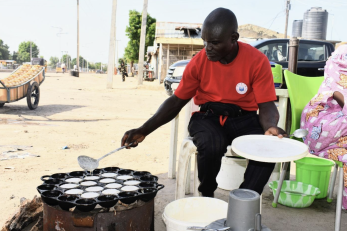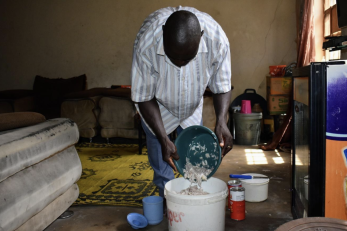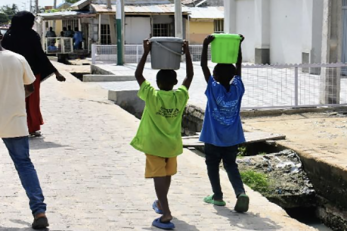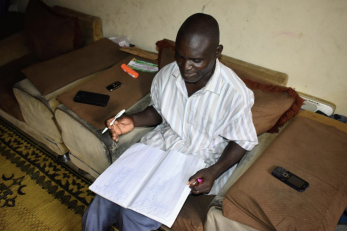Building business resilience and changing gender perception, one masa at a time

Masa, a fermented rice cake, is a traditional delicacy loved by the people in Northern Nigeria, young and adults, the wealthy and poor. If you stroll through the bustling streets, you will encounter the ubiquitous sights of women cooking and selling this beloved treat. Terna David is one of the very few men who work as a masa fryer in Maiduguri, a profession traditionally done by women only. “My mom was into the sales of pastries for a living and we grew up seeing her doing so. I supported her in the process even as a male child”, says Terna as he keeps frying masa. “I have also always been in the kitchen, so this was nothing different for me”.
However, Terna says he has faced discrimination working in a female-dominant business. “At some point, I was accused of denying women their business rights. My friends disassociated from me as it was perceived as demeaning for the male gender. When I fell ill some time ago, some said it was a spiritual attack on me because of the business”, he recalls. Yet, he was undeterred, staying resolute to make his business flourish.
His unwavering determination, however, couldn't shield him from a different kind of torment; lack of growth in the business. “Though I was getting patronage, I had nothing to show for it in the form of growth for my business. When I get money, I just use it up for immediate needs and wait for the next opportunity”, Terna recalls. “People looked down on me because of my financial situation, as I couldn’t support my daughter and other family members. I had very low self-esteem as I didn’t have a voice”.
Terna’s concerns mirror the struggles faced by many Nigerian micro, small, and medium enterprises (MSMEs). One study estimated that over 80% of companies failed in the first 18 months of operation in Nigeria, and about 80 % of MSMEs failed due to cash flow problems arising from poor financial management practices. Considering that MSMEs contribute to more than 45% of the country’s GDP, a lack of sound financial management skills presents a great threat as well as a tremendous opportunity.
The USAID-funded Feed the Future Nigeria, Rural Resilience Activity (RRA), led by Mercy Corps in collaboration with the International Fertilizer Development Center and Save the Children International, is partnering with the private sector actors to help MSMEs improve business management to combat poverty and hunger in conflict-affected areas of Northeast Nigeria. RRA has partnered with local business development service providers (BDSPs) to provide business management training to MSMEs in Northeast Nigeria on finance, marketing, and value-addition.

Due to the escalating inflation in the country, many MSMEs have failed. However, the story is different for Terna, where he attributes his business success to the training he received for understanding sales trends and its influencing factors. “Keeping daily records has not only improved my business but also that of being accountable, for me and my staff. I can also tell how much I’ve made across different contracts for meals I’ve earned. I can tell the peak of the season for me and try to understand what influenced the sales, which helps me in reducing and increasing my production to avoid losses”, Terna recounts the changes.
He has become more efficient in cutting down business expenditures. “I used to make roughly $ 25 weekly before the training, but now at the peak of demand, there are days I make up to that amount only in a day. And I have records to prove it”, Terna shows the record proudly. Keeping meticulous records has not only boosted his business but also allowed him to reward his workers with higher salaries. This has increased dedication from his workers, as he can now offer them better value for their services than other businesses. He now has close to 45 workers who work with and learn from him at different time intervals.

“Many years of hard work have just yielded results. So much of a difference has happened to our businesses. My business would have run down like many others due to the current economic challenges, but we are doing well even now”, Terna reflects on his transformative journey through the capability-building program. The same men who criticized him when he first started masa frying are now asking for his financial support and bringing their wives for Terna to train them in culinary skills. “I have changed the perspective in my community when it comes to gender roles in business”.Terna beams with pride. As he gazes into his next step, Terna's eyes sparkle with hope. He is saving up to achieve his dream of building a new kitchen where he will be able to produce varieties of foods and snacks to supply not just his state but the broader region.
Terna stands as one among 11,000 MSMEs who benefited from the business management capability building program provided by RRA. For MSMEs, the ability to keep records and make informed decisions based on data represents a gateway to unlock the vast potential for business management and expansion. In today's volatile economic climate where threats such as inflation and the removal of gas subsidies cast a shadow over the financial stability of many MSMEs, solid business management knowledge can be a powerful shield against such economic shocks. RRA aims to establish sustainable partnerships between the local BDSPs and MSMEs for continuous business management capability building.
